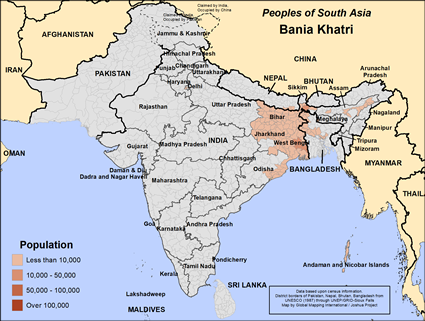Bania Khatri in Nepal

Send Joshua Project a photo
of this people group. |

Map Source:
People Group data: Omid. Map geography: UNESCO / GMI. Map Design: Joshua Project.
|
| People Name: | Bania Khatri |
| Country: | Nepal |
| 10/40 Window: | Yes |
| Population: | 900 |
| World Population: | 210,600 |
| Primary Language: | Maithili |
| Primary Religion: | Hinduism |
| Christian Adherents: | 0.00 % |
| Evangelicals: | 0.00 % |
| Scripture: | New Testament |
| Ministry Resources: | Yes |
| Jesus Film: | Yes |
| Audio Recordings: | Yes |
| People Cluster: | South Asia Forward Caste - Bania |
| Affinity Bloc: | South Asian Peoples |
| Progress Level: |
|
Introduction / History
The Banias originated over 5,000 years ago in Gujarat and Rajasthan, and they are also called Vania or Mahajan. Their name is derived from Vaniji, which means "trader" in Sanskrit, an ancient South Asian language.
Of the four major varnas (caste clusters), Banias are in the third one, the Vaishyas. This caste cluster has always been about trade, business and money lending. Throughout history they were traders of grain and spices. Despite their high incomes, the Banias have only modest status in the Hindu caste pyramid. They resent the higher two varnas, the Brahmins and the Kshatriyas, and thus Banias have often been leaders in caste reform movements. Mahatma Gandhi is one example, but there have been many others throughout India's long history.
There are smaller groups of Banias, one of which is the Khatri. They live all over India and Bangladesh. A tiny number are in Nepal.
What Are Their Lives Like?
Khatri Bania fathers teach their children business skills. From an early age, children are drilled in math and detailed calculations with the end purpose of getting the upper hand in business transactions. Bania parents often teach their children to "never give; always bargain and make money." This attitude can make them unpopular with other communities. Other communities often resent them because they lend much needed money at high interest rates. A pre-literate farmer might take a loan from a Bania only to find that a high percentage of his harvest will be taken away as interest. Customers often must put their farms or their gold up for collateral in case they cannot pay back their loans.
What Are Their Beliefs?
Nearly all Khatri Banias claim the Hindu religion, but as merchants they have chosen gods that reflect their profession. The rupee (Indian currency) is sacred with the Bania, and they use old coins for religious ceremonies. Ganesh (the god who helps overcome obstacles) and Lakshmi (the goddess of wealth) are among their favorites. Many are devoted to Vishnu and Shrinathji. Some are Jains, a reform movement of Hinduism.
What Are Their Needs?
The Khatri Bania do not lack for finances or the things that come with it. They lack the spiritual hunger it takes to seek and find the only savior.
Prayer Points
Pray that Jesus will reveal himself to the Khatri Bania, and that many will give their hearts to Jesus Christ and dedicate their lives to him.
Pray that Christian workers will penetrate the wall of rejection they face when presenting the gospel.
Pray for the privileged Khatri people who do not know how much they need the savior. While educated in many things, the truth of spiritual matters remains absent from their understanding.